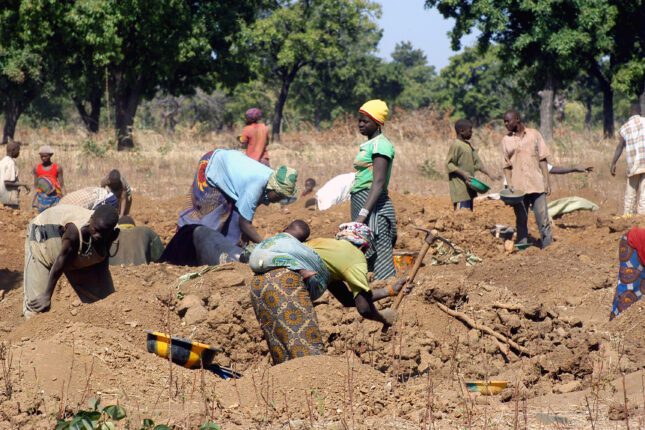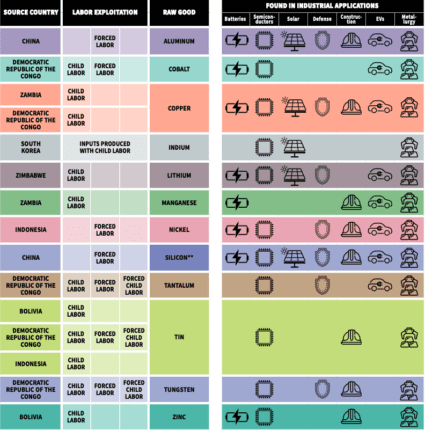-
Children and Slaves are Mining our Critical Metals (and Not Just Cobalt)
December 3, 2024 By Vince Beiser
This article is adapted from Vince Beiser’s “Power Metal” newsletter.
If you’ve heard anything about the dark side of the shift to renewable energy and digital tech—one of the main topics of my new book, Power Metal: The Race for the Resources That Will Shape the Future—you’ve probably heard about the children working in cobalt mines in the Democratic Republic of Congo (DRC). That particular outrage has been covered by major international news outlets, human rights organizations and another recent book, Cobalt Red. But it turns out there are many other places where children, as well as enslaved adults, are producing the metals that go into our electric cars and cell phones.
A recent report from the US Department of Labor provides a grim catalogue of such places. This year’s annual List of Goods Produced by Child Labor or Forced Labor includes a dozen minerals “essential to our clean energy future and national security.” In Bolivian mines that produce silver needed for solar panels, “children as young as age 13 … haul heavy loads of ore, work in narrow tunnels at risk of collapse, are in close proximity to explosives, inhale toxic fumes and dust, and generally lack protective equipment,” notes the report. In Indonesia, kids toil in tin mines. In Zambia there are children as young as six harvesting copper and manganese “in dangerous underground tunnels…often with no PPE, minimal food and in unsanitary conditions where children endure verbal and physical abuse.”
Obviously, children working in mines and industrial sites is never a good thing. But sometimes it is the lesser of two evils. For desperately poor families in countries with few opportunities, the choice often isn’t between putting a kid to work or sending them to school. It’s between putting them to work or starving. Forced labor, however, is just plain evil, and forced child labor is the worst of all. The report finds evidence of forced labor in supply chains of Indonesian nickel, Chinese aluminum and silicon, and South Korean indium. The DRC does seem to be the worst across the board, with children not only in its famous cobalt mines but also enslaved children in its tantalum, tin and tungsten industries.
All of those raw materials can end up in a horrifying range of manufactured products we need for the energy transition and our digitally-enabled lives. Zinc ore mined by kids in Bolivia is processed in South Korea to extract indium, which is used in solar panels, flatscreen TVs and phone screens. Uyghurs in China are forced to make polysilicon that is used in semiconductors and solar generators. Copper and cobalt dug up by children in the DRC, and lithium unearthed by kids in Zimbabwe, are all used in electric vehicles and their batteries. (See Fig. 1)

Figure 1: Labor Risks in Mineral Supply Chains, 2024 List of Goods Produced by Child Labor or Forced Labor, US Department of Labor, p. 27
How do you force adults to work in this day and age? Here’s an example, from the report’s description of forced labor in Chinese-owned nickel factories in Indonesia: “Workers are often deceptively recruited in China. After they arrive in Indonesia, many workers receive a lower wage than promised along with longer work hours. Workers regularly have passports confiscated by employers and experience arbitrary deduction of wages, as well as physical and verbal violence.” They are also subjected to “restriction of movement, isolation, constant surveillance, and forced overtime.” All told, the report estimates nearly 28 million people around the world are being forced to work in everything from nickel mines to fish farms.
None of which is to say that you should not buy an EV or put solar panels for your roof. We absolutely must make the switch from fossil fuels to renewables, for everyone’s sake. But we can look for ways to clean up these supply chains.
There are efforts in that direction, especially on the cobalt front. Eager to reassure queasy shareholders, many mobile phone and car companies have pledged to keep cobalt mined by children out of their batteries. That typically involves hiring third-party auditors to monitor conditions in the mines where their raw materials come from. Critics, however, charge that these inspections are often ineffectual. Developing a more muscular system of audits could help. Meanwhile, some companies are simply trying to stop buying from the DRC altogether. The problem there is that if all of the battery makers in the world stopped buying cobalt from the DRC, or any other country where children and slaves work in mines, they might make their customers and shareholders feel better, but they would also put many thousands of desperately poor people out of work. A better approach might be for companies and governments to help raise environmental and labor standards in those countries’ mines, rather than seeking alternatives to them.
Another potentially helpful tactic sounds at first counter-intuitive to the environmentally minded: make it easier to mine in the US. That’s one of the goals of the Biden administration’s landmark Inflation Reduction Act, the future of which is at best uncertain under incoming President Trump. Mining is never pretty—it is by its very nature destructive to the Earth, and a blight to whoever lives nearby. But the US holds vast amounts of critical metals, and American mines are held to much higher environmental, social and labor standards than those in places like Indonesia or the DRC. No doubt, even with modern regulations, critical metal mines would be hard on the American landscape. But maybe that’s a reasonable trade-off to reduce American dependence on metals mined by children and slaves.
The bottom line is, we need those metals to stave off the biggest threat of all: climate change. They have to come from somewhere. Renewable energy will never be completely “clean” or “green,” but we can certainly make it better—perhaps by starting in our own backyard.
Vince Beiser is the author of Power Metal: The Race for the Resources That Will Shape the Future. Follow his reporting on the Power Metal newsletter.
Sources: Amnesty International, Department of the Interior, MacMillian, New Yorker, Penguin Random House, Reuters, USGS, Washington Post
Photo credit: Artisanal mining in Burkina Faso, courtesy of Gilles Paire/Shutterstock.com.
 A Publication of the Stimson Center.
A Publication of the Stimson Center.




